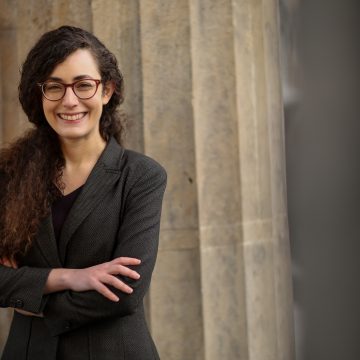PLAY
Farvos mener libn
[Why Men Love]Synopsis
A room in the home of the wealthy Lilienblum family. Jenny Lilienblum’s grandmother (referred to simply as Bobe, grandmother) despairs of her beloved Jenny’s stubborn disposition. She has raised Jenny since she was orphaned at a young age, and can also list her good qualities: she is young, beautiful, clever, rich, well-educated, etc. Jenny wants to know which one of these attributes has motivated her fiancé, successful lawyer Leopold Schweinhofer, to want to marry her. And, more generally, what makes men love women? Much to her grandmother’s consternation, Jenny has invented a “comedy” to test Leopold: she had her grandmother write to Leopold to tell him that Jenny is suffering from a serious (and contagious) illness, and more recently that she is doing better and he can visit her. Now it is time to act out the comedy: Jenny will pretend (with the help of makeup and a wigmaker from the theater) that she was suffering from the pox and has lost her looks. When Leopold arrives, the grandmother informs him sadly (after keeping him in quite a bit of suspense) that Jenny is very weak and is unrecognizable since her illness. Leopold consoles himself that Jenny will regain her looks over time and become even more piquant, opining that women set altogether too much store by their looks. Jenny is led in by her grandmother; her grotesque disguise is complete, but because she wears a veil, Leopold does not notice at first. Jenny bemoans her condition and Leopold attempts to console her, not knowing the extent of the disfigurement she is complaining about. She removes the veil and Leopold is horrified. He decides, however, that her money is more important to him than her looks, and imagines how people will praise his nobility for not breaking the engagement. When Jenny offers to release him from their engagement, he refuses to consider it because, he claims, love is the most important thing. Jenny tells him she is relieved to hear him say this, because her uncle lost her money on the stock market, but that should not matter because he has a good income of his own. Leopold is furious and threatens to have her uncle arrested if he does not pay back the money. When Jenny refuses to allow it, he switches to the formal address and gets ready to leave, telling the grandmother he will not return. With Jenny temporarily out of the room, he feels free to tell her grandmother the “bitter truth” that he cannot marry such a “repulsive” woman if she does not have money. The grandmother says that if he thinks Jenny is repulsive he was not looking closely enough, just before Jenny returns, restored to her normal appearance and carrying her wig. She reveals the truth to him that she still has both her money and her looks, and when he dismisses her masquerade, she points out that he wears a mask every day as a lawyer. Leopold tries to reassure Jenny that any hurt feelings she had as a result of the comedy are her own fault and that she should not expect him to be an angel. Jenny tells him that this was not a mere game; the question of why men love is of crucial importance. If love is motivated by material concerns or base desires, it is not actually love. Jenny says that men tend not to take women’s thoughts or opinions seriously and do not bother to truly get to know them. She claims that all men are egoists, but Leopold is worse than a prostitute because he was willing to marry her for money he did not need even though he was disgusted by her. While Leopold claims her expectations are too high, she does not consider them unreasonable in light of the sacrifices a woman is expected to make in marriage. After showing Leopold the door, she tells her grandmother that they deserve applause for their acting, but admits that people (presumably men) might think it is a comedy but “they don’t know how tragic our roles are!”
